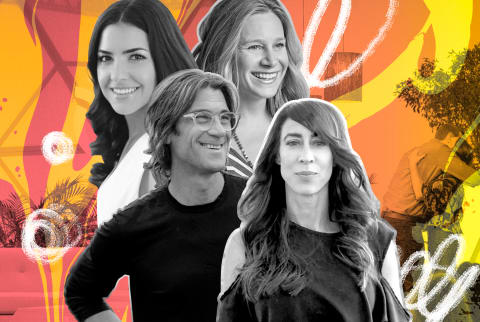Do Mind-Altering Drugs Have A Place In Wellness? 4 Health All-Stars Debate


From the decriminalization of psilocybin in Oakland and Denver to the rise in ayahuasca ceremonies around the world, it feels like psychedelic drugs previously taken in hushed settings are now gaining mainstream appeal. So much so that the rate of use is quickly outpacing the research on how these substances actually affect the body.
At this year's revitalize event, we invited four health experts to give their take on what exactly this means. What role, if any, should drugs like THC, MDMA, LSD, ayahuasca, and psilocybin play in wellness? Who should be taking them, and how can they do so safely? The panel covered massive questions like these, and, needless to say, not everybody agreed on the answers. And that included me! I jumped into the debate (a revitalize first) to say that after seeing too many friends have too many close calls, I don't believe they have a place in wellness. Here are some snippets from the fascinating discussion.
4 different perspectives on mind-altering drugs & their place in the wellness world.
Holistic psychiatrist Ellen Vora, M.D., said that as a clinician, she's watched the mental health crisis build firsthand and thinks psychedelics could help chip away at it. Last year, psilocybin was granted "breakthrough therapy" status by the FDA for its potential use in depression treatments, and Vora explained the biology behind how these psychedelics can change our worldview, expand our sense of self, and heighten our feeling of being part of a collective. "If you take these substances with the proper set and setting, and you're the right person to take these—then it's pretty reliable you're going to have a peak spiritual life experience," she said, adding that reintegration and guidance after the psychedelic experience are what really makes it stick.
Melissa Hartwig Urban, the co-founder of Whole30, agrees that reintegration can lead to lasting positive change but still thinks we should be wary of thinking of it as a cure-all. "I do think people are looking for shortcuts. And you see that everywhere, not just with drug use but with nutrition and with fitness," said Hartwig, who has been in recovery from addiction for 19 years. "You see people who take a very specific, contextual, and maybe cultural practice, and they see it working very well in this particular context, and then they extrapolate it out to say this works equally well for everyone... And there's a lot of danger in that."
It's also a matter of who's marketing these drugs to us, added bestselling author and plant-based pioneer Rich Roll: "My concerns lie more in the ubiquity with which we're seeing it now and the mainstreaming of it," he said. "I think it's super problematic when we step into this mindset that the solutions that we seek in terms of our overall well-being are to be found in these externalities."
Molly Maloof, M.D., a concierge physician who works with a lot of Silicon Valley investors, executives, and entrepreneurs, echoed the sentiment: "People have been using these since the beginning of time. We've coevolved with them... The question is in America, why is it that we like to capitalize and commercialize everything into something that seems like it's good for us?" That being said, she does think that early research shows psychedelics can shift worldviews for the better—when used under the right conditions.
Tune in to the full podcast episode to dive deeper into this dialogue on when psychedelics expand consciousness—and when they do more harm than good.

Jason Wachob is the Founder and Co-CEO of mindbodygreen and the author of Wellth. He has been featured in the New York Times, Entrepreneur, Fast Company, and Vogue, and has a B.A. in history from Columbia University, where he played varsity basketball for four years.